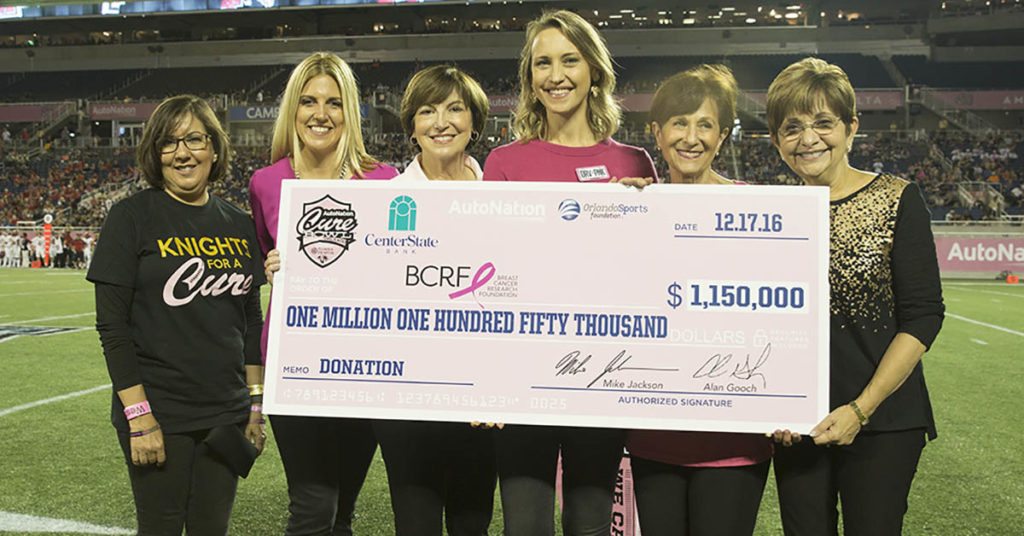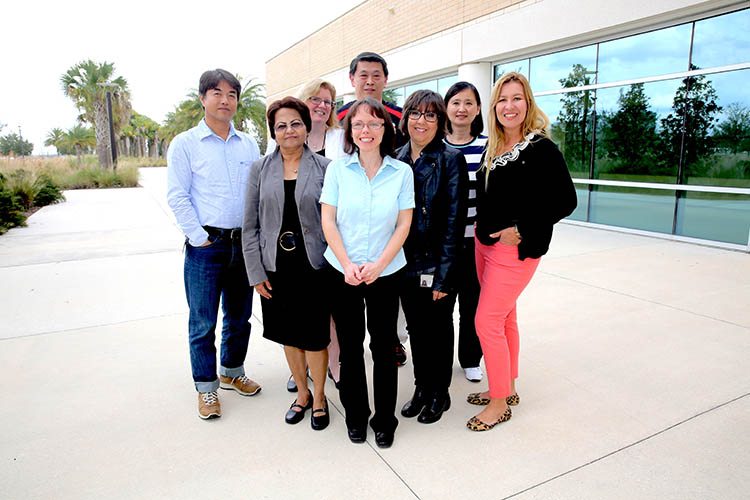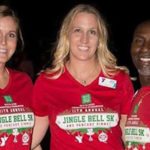“We’re going to play football and beat cancer at the same time,” she said as the game began. “There couldn’t be a better combination.” Dr. Annette Khaled, UCF College of Medicine cancer researcher
As college football’s top team is crowned, you may not know that the first bowl game of this post-season generated $1.15 million for breast cancer research – including $250,000 for College of Medicine scientist Dr. Annette Khaled’s work to stop metastatic cancer cells in their tracks.
The Dec. 17 AutoNation Cure Bowl pitted UCF’s Knights against Arkansas State, with the Red Wolves winning 31-13 before about 30,000 fans at Orlando’s Camping World Stadium.
The Cure Bowl is the only NCAA football bowl game with a charity in its name, and proceeds of the event support the Breast Cancer Research Foundation (BCRF), the largest private funder of breast cancer research worldwide. Dr. Khaled is one of just five researchers in Florida to get BCRF funding and before the game had received about $650,000 from the Cure Bowl for her work at the College of Medicine’s Burnett School of Biomedical Sciences
Dr. Khaled’s lab has discovered a way to kill spreading breast cancer cells, and her new technology has generated a licensing agreement that will accelerate the therapy’s path to clinical trials.
Metastatic cancer cells that spread from the original tumor to the brain, lungs and bones are the leading cause of death for most cancer patients. Dr. Khaled chairs our med school’s Cancer Research Division, a group of scientists dedicated to finding better treatments for a disease that kills more than 1,500 people a day in this country. We call these researchers our “Cancer Assassins,” and many are based at our Lake Nona Campus:
- Deborah Altomare is finding new ways to fight pancreatic and ovarian cancer by studying how cancer tumors interact with surrounding cells and developing targeted drugs and immune cell therapy to block the growth and spread of cancer tumors.
- Claudia Andl creates a cancer tumor’s environment in a test tube to better understand how tumor cells interact with their environment and spread. With that focus, she is looking to develop better treatments for oral and esophageal cancers.
- Karl Chai’s research focuses on HER2+ breast cancer – an especially aggressive form that hits about 1 in 5 breast cancer patients. This type of cancer is hard to fight because the cancer cells have a protein that causes them to grow and spread quickly. Dr. Chai is looking at the novel mechanisms in these cells and what makes them resistant to Herceptin, the drug approved for treatment.
- Ratna Chakrabarti is studying the cellular differences between aggressive and more inactive cancers to better identify patients who have a genetic predisposition to develop drug-resistant prostate cancer. By identifying the genetic and epigenetic components of prostate cancer, Dr. Chakrabarti is hoping to develop better therapies for prostate cancer patients and improving their quality of life.
- Li-Mei Chen is identifying the novel mechanisms in lung cancer cells that make them resistant to chemotherapies. Lung cancer is the second most common cancer in men and women and is by far the leading cause of cancer deaths. About 1 in 4 cancer deaths is from lung cancer – more than colon, breast and prostate cancer combined.
- Alicja Copik is developing ways to activate the body’s Natural Killer (NK) cells to kill cancer. NK cells are a veritable army that identify and attack invaders like cancer and viruses. She has developed a technology that uses nanoparticles to activate and grow NK cells to fight cancer. The therapy will begin clinical trials in 2017 and shows promise in treating leukemia and other cancers.
- Jihe Zhao’s research question is, “Why does the heart rarely get cancer?” He is looking to understand why cancer spreads to some organs like the brain and not others like the heart. Dr. Zhao is also discovering how to protect the heart from damage caused by anti-cancer therapies.
These scientific superstars have great ideas for fighting disease. They’re only limited by funding. Partners like the AutoNation Cure Bowl provide the support to turn ideas into cures – thanks to research happening in our own back yard.



